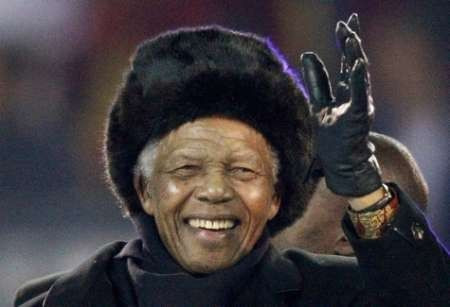Nelson Mandela Recovering Well, But Mental Health Concerns Still Taboo

Nelson Mandela is doing well after a health scare had him hospitalized for nearly three weeks in December, according to a statement by the office of South African President Jacob Zuma.
Mandela “has recovered from his surgical procedure and the lung infection, his doctors said today, 6 January 2013,” according to the statement.
“The medical team said President Mandela has made steady progress and that, clinically, he continues to improve. He had undergone an operation to remove gallstones last month and was also troubled by a recurring lung infection. He continues to receive high care at his Houghton [Johannesburg] home and his daily routine is being gradually re-established.”
Mandela is revered as the father of modern South Africa. He came of age during the era of apartheid, or institutionalized racial segregation. After years of underground activism on behalf of the African National Congress, or ANC, a majority-black political party that was outlawed under minority white rule, Mandela was imprisoned for 27 years. He was released in 1990.
In 1994, the de facto end of apartheid, Mandela was elected the first black president of South Africa. During his short tenure -- he stepped down after serving just one five-year term -- he made it his mission to promote equality and progress for all South Africans, emphasizing his belief that white and black citizens had to work together to heal old wounds.
The ANC has dominated the national government since 1994, and economic growth has made South Africa the largest economy on the continent.
Mandela first caught tuberculosis during his years in prison, and lung-related ailments have plagued him ever since. Today he is visibly frail at the age of 94, and there is some controversy regarding the state of Mandela’s mental health. The former president -- who is often called Madiba, an old tribal nickname -- has been deified for his role in ending apartheid in South Africa. For that reason, many people take offense at any suggestion that the ailing leader might be losing his grip on reality.
But some have taken it upon themselves to break the silence.
“Madiba is losing his mental faculties,” wrote Nathan Geffen, the editor of South Africa’s weekly GroundUp online magazine, on Dec. 12. “Only those closest to him know how seriously he is losing his faculties, but we all know, from several public clues, that there is some loss and it appears to be quite serious.”
Geffen’s article was later published for international audiences in the Guardian, and it met with a mixed reception. But Mandela’s own writings hint that he did not wish to be thought of as immortal by his admirers.
“One issue that deeply worried me in prison was the false image I unwittingly projected to the outside world; of being regarded as a saint,” said Mandela, as published in “Conversations with Myself,” a 2011 compilation of his writings. “I never was one, even on the basis of an earthly definition of a saint as a sinner who keeps trying.”
Mandela retired from the spotlight in 2004, but he was seen in public in 2010 to mark the FIFA World Cup, which took place in South Africa that year -- the first time it had ever been held on the continent.
It was a fitting final appearance, since sports had played a central role in Mandela’s fight for unity 15 years earlier. During the Rugby World Cup in 1995 -- the final match was held in Johannesburg -- Mandela, who was just over a year into his presidency, set an example for his black constituents by attending the game and presenting the winners’ trophy to Francois Pienaar, the white captain of South Africa’s team, the Springboks.
Rugby had long been a part of white culture, and the green and gold colors of the Springboks jersey had grown to become a symbol of white supremacy in the country. Mandela’s decision to celebrate the victory has long been heralded as one of South Africa’s most significant historical moments.
So when Mandela made his final public appearance in 2010, the FIFA soccer stadium in Johannesburg made for a nostalgic setting.
It was bitterly cold on July 11, the day of the final match between Spain -- the ultimate victor -- and the Netherlands. Mandela wore a long black coat and a thick fur hat as he rode out into the stadium, waving alongside his wife Graca Machel as the crowd roared with applause.
And that was it. Mandela has kept quiet since then, leaving media around the world to speculate on the state of his health. Now that he has apparently recovered from this latest scare, his admirers around the world can breathe a sigh of relief -- until the next time a piece of alarming news emerges.
Meanwhile, South African politics will go on as usual. Zuma is expected to cruise to victory for a second term in the 2014 presidential elections, keeping the ANC in power at least until 2019. The country has a long way to go -- inequality, poverty, and unemployment are rife, and racial tensions are still quite evident.
But if apartheid is the starting point, it is undeniable that the country has come a long, long way.
It may pain some South Africans to admit that their onetime leader will not be around much longer. But they can at least be sure that the freedom fighter’s legacy will far outlast his life, helping the country to keep up its pursuit of progress even after Madiba is gone.
© Copyright IBTimes 2024. All rights reserved.






















